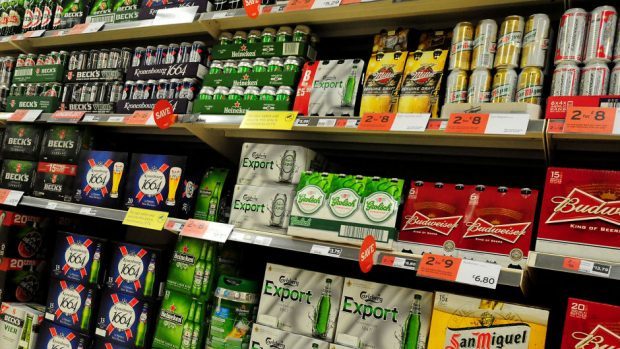Judges have cleared the way for the Scottish Government to introduce a minimum price for alcohol.
The Court of Session in Edinburgh ruled against a challenge to the plans by the Scotch Whisky Association (SWA) yesterday.
It and other drinks producers had argued they were a breach of European law – but the appeal was rejected.
Ministers can now move to implement the “lifesaving” policy, which was passed by the Scottish Parliament in 2012.
Under the plans, a minimum price of 50p per unit will be introduced.
First Minister Nicola Sturgeon welcomed the news, adding: “Minimum pricing is a vital public health measure with strong support from those who work on the frontline of alcohol misuse. It will save lives.”
But SWA chief executive, David Frost, said the organisation continued to believe minimum unit pricing (MUP) was a restriction on trade and that there were more effective ways of tackling alcohol misuse.
He said: “We will study the details of the judgment and consult our members before deciding on next steps, including any possible appeal to the UK Supreme Court.”
Judges at the European Court of Justice (ECJ) in Luxembourg concluded last year that the flagship SNP policy would only be legal if the same end could not be achieved in a way less restrictive to trade.
Their ruling pointed to tax rises as an alternative means of increasing the cost of drink, which would allow traders to retain the freedom to determine their selling prices.
But the question was transferred back to the domestic court for a final decision on whether other measures would be as effective in achieving the desired public health benefit.
Yesterday, the Court of Session dismissed the appeal against the plans for a second time, on the basis the grounds submitted were “not well founded”.
The judges said the court’s previous ruling “correctly concluded that whatever arguments may be deployed against it, there was evidence which demonstrated that the alternative of increased tax, with or without a prohibition on below cost sales, would be less effective than minimum pricing”.
Scottish Public Health Minister Aileen Campbell said she was proud Scotland had led the way and insisted the judgment should mark the end of the legal process.
She added: “The SWA represents some of Scotland’s finest whisky brands, and while they were entitled to raise this action, they and the wider drinks industry must now respect the democratic will of the Scottish Parliament and the ruling of the Court of Session and enable this lifesaving measure to be introduced.”
The Scottish Government has consistently argued MUP is the “most effective mechanism” for tackling this problem.
But the SWA claimed it would be ineffective in its aims, penalise responsible drinkers and was beyond the powers of Holyrood.
Responding to yesterday’s ruling, Mr Frost said: “We continue to believe that MUP is a restriction on trade and that there are more effective ways of tackling alcohol misuse.
“However, we of course remain committed to working with all partners to address this problem so that the long-term trend of declining alcohol-related harm in Scotland continues.”
The Scottish Conservatives’ health spokesman Donald Cameron said the Tories had backed the policy “on the condition it would be legally sound and could be dropped if found not to be working”.
He added: “We need to monitor the results closely to see what impact it has on Scotland’s damaging and complex relationship with alcohol.”
Alison Johnstone, health spokeswoman for the Scottish Greens, accused the big drinks firms of “copying the historic behaviour of the tobacco industry”.
